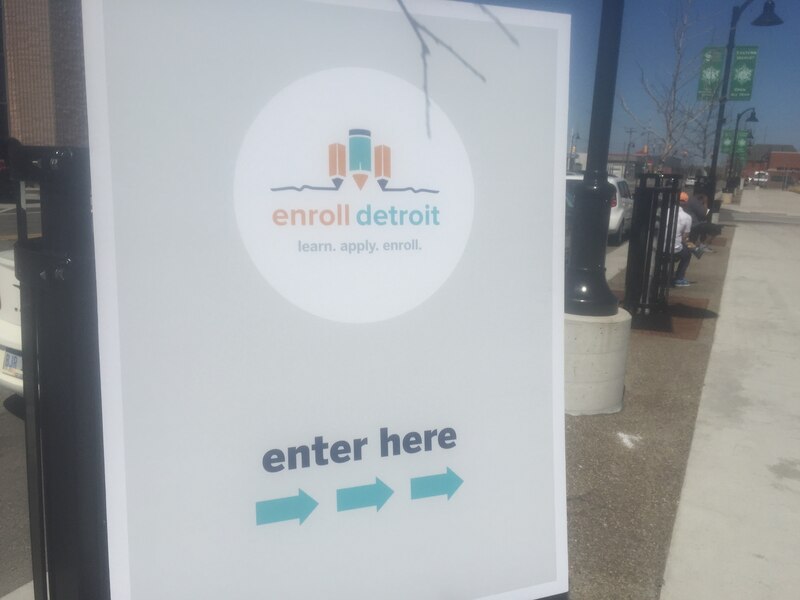A sophisticated new enrollment tool that was supposed to make signing up for school easier in Detroit won’t be of much use to the thousands of families whose children could be displaced by upcoming school closures.
Despite the more than $700,000 and countless hours of planning that went into creating a single application for Detroit’s competing district and charter schools, the effort has been put on hold indefinitely — a victim of bad timing, poor planning, and a toxic political environment.
“It’s a shame,” said Karey Reed-Henderson, a former charter school leader who served on the planning committee for what came to be called Enroll Detroit.
“We came together. We hashed things out,” Reed-Henderson said of a process that brought together charter school leaders with officials from the Detroit Public Schools, the state-run Education Achievement Authority and representatives of community groups.
“It wasn’t always roses and butterflies but the conversation was always around what’s best for the kids and best for families,” she said.
“Unfortunately it just got muddied.”
Now, as 25 Detroit schools face possible shut-down by the state, the handful of staffers still working at Enroll Detroit hope they can use their knowledge and technology to help at least some of the roughly 12,000 children who could be affected.
But the grand vision of creating a common enrollment system similar to those used in other cities is largely dead — at least for the near future.
In common enrollment cities like New Orleans, Denver, Newark and Washington DC, parents no longer need to navigate a mix of deadlines and requirements to apply to multiple schools. They don’t need to drive around, submitting one kind of application to their local district school, another kind to district magnet schools and a host of other applications to a host of charter schools.
Instead, parents use a single application that lets them rank the schools they want for their children. A computer then crunches admission criteria and applies a lottery to assign children to schools.
Proponents say common enrollments are more equitable because most applicants have the same shot at sought-after schools. The systems also remove some of the guesswork for administrators by preventing parents from enrolling in multiple schools, then waiting until September to make their final decisions.
The systems have been controversial around the country, running into opposition in cities like Boston and Oakland because they reduce the influence some parents have had in school admissions. They can also hurt traditional districts by making it easier for families to choose charter schools.
But few cities have the deeply poisonous relationships between district and charter schools that doomed the effort in Detroit.
Here, in a city where roughly equal numbers of students attend district and charter schools, and where thousands of students travel out of town to attend suburban schools, what happened to Detroit’s common enrollment shows how difficult it can be for competing factions to come together. The tensions exposed by the issue are the same ones that make it difficult to solve other serious challenges in Detroit, such as student transportation and teacher recruitment, that would be easier to address if competing schools worked together.
That kind of collaboration isn’t dead, said Reed-Henderson who is the founder of the Metro Detroit Charter Center and the Detroit Teacher Village. “But I think the right people need to get back in the room.”
* * *

Officials with the advocacy group Excellent Schools Detroit (which is a Chalkbeat supporter) first proposed creating a common enrollment for Detroit in 2013. Though competition for students is fierce in a city where school funding is based almost exclusively on student enrollment, the school leaders who came together around the enrollment effort hoped they could find solutions to shared problems.
“Schools were struggling to find parents and parents were struggling to find schools,” said Dan Quisenberry, who heads the Michigan Association of Public School Academies, a charter school group that was involved in the early days of the effort.
There were risks for all parties, said Neil Dorosin, the consultant and school enrollment expert who was brought to Detroit to determine if common enrollment could work here.
“It was very threatening to the district because right now there are a lot of children who don’t make choices because they get rolled up into their district school,” Dorosin said. “It was threatening to the (Education Achievement Authority) for similar reasons. And it was threatening to charter schools who would have to play by a much more transparent set of rules.”
Individually, he said, “it’s not in anyone’s best interest, but it is in the best interest for the customer.”
As the planning group met in 2014 and 2015 to hammer out details, Excellent Schools Detroit raised hundreds of thousands of dollars from foundations and hired a tech company to build a massive database that could match students with schools.
Then, with the system ready to go last year, the group announced it would plow ahead with a pilot project to see how many students it could place for the 2016-2017 school year.
But just as the pilot was launching, a nasty fight was raging in Lansing over a package of bills aimed at keeping the cash-strapped Detroit Public Schools out of bankruptcy.
One of the provisions in the bills would have created a city-wide Detroit Education Commission, appointed by the mayor, that would have had influence over the opening and closing of district and charter schools.
The Detroit Education Commission was strongly opposed by some charter school advocates including Betsy DeVos, an influential Michigan philanthropist who was confirmed this month as the U.S. Secretary of Education.
Because Excellent Schools Detroit was among Detroit organizations backing the commission and because enrollment was one of the areas over which the commission would have had authority, the issue became politically charged. Though the commission was ultimately removed from the final legislation, the threat of it kept some charter schools away from the enrollment pilot.
“There was a big question of trust,” said Quisenberry, who said he grew concerned that common enrollment officials would steer families to district schools at the expense of charter schools.
To make things even more challenging, the Detroit Public Schools were in turmoil.
Darnell Earley, the state-appointed emergency manager who was running the district at the start of 2016, resigned amid controversy in early February.
Earley was replaced by former bankruptcy judge Steven Rhodes, who agreed to serve as “transition manager” until the the city schools could be returned to a locally elected school board. Because Rhodes did not want to make any long-term commitments for the district, he announced that DPS would not participate in the common enrollment pilot.
That meant that the pilot went forward with less than a quarter of Detroit schools. Of more than 200 schools in the city, just 41 participated in the pilot, including some charter schools, a private school and the 15 schools in the Education Achievement Authority.
The application system placed just 78 children — a fraction of the almost 20,000 kids who were applying to kindergarten or ninth grade, the two grades that were the focus of the pilot.
School enrollment counselors also provided advice to a few hundred additional families, including some who were displaced by charter schools that closed last year.
* * *

Whether common enrollment has a future in Detroit isn’t clear.
The new Detroit school board, which was sworn in last month, has not yet publicly discussed the issue. A district official who played an important role in the planning process and a district spokeswoman both declined to comment on whether the district might someday be open to joining a common enrollment system.
Meanwhile, at Excellent Schools Detroit, a new interim director is rethinking the organization’s mission. The group’s two top officials — its longtime CEO and vice president — both left at the end of 2016.
But some Enroll Detroit staffers are still on the payroll, and they say they’re looking to use the resources they’ve created to help families affected by state-mandated school closings this spring.
State officials “are saying, ‘We want to get the kids in a higher quality school’ but what kind of chance are they going to have?” asked Maria Montoya, Enroll Detroit’s executive director.
Families won’t know for sure which schools will close until March or even later since state decisions are likely to be challenged in court. By then, many of Detroit’s most sought-after schools, including charter schools and selective district schools, will already have completed their enrollments.
Many of the schools targeted for closure are in neighborhoods that don’t have many high-performing schools and where parents have few resources to figure out which schools are taking new students and which offer transportation.
A letter state officials sent to parents suggested they reach out to districts as far as an hour away from Detroit — including some that don’t even accept Detroit kids.
Montoya said she’s hoping to adapt Enroll Detroit’s computer system to help track kids as they move to new schools, making sure their records transfer and that things like special education services are continued — details that sometimes fall through through the cracks when schools close.
She’s also hoping that over the summer, some schools will use Enroll Detroit to fill vacancies.
“Instead of using the full system, we could take the technology we have and have schools give us the seats they have available and we could do a real-time placement in June, July, and August when we know families are really applying and looking for seats,” Montoya said.
City leaders are no longer talking about a single city-wide application but there have been conversations around smaller steps such as a common application timeline that would make things easier for parents and schools.
If district and charter school leaders ever do decide to restart the full common enrollment, Montoya said the system remains available and could be fired back up.
“We have all this investment and not just in the technology,” Montoya said. “We have the folks who did our marketing. They created assets other cities have taken years to build. We have logos and tents and outreach things … We have staff and a team and knowledge. The question is: How do you move forward in this landscape?”

